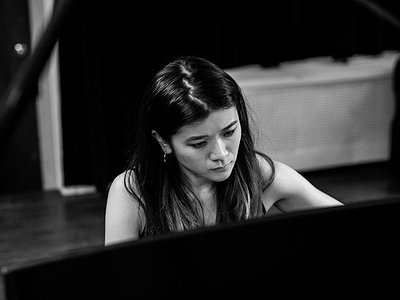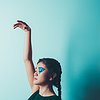There are many descriptions of the ideal state of mind for being creative. What is it like for you? What supports this ideal state of mind and what are distractions? Are there strategies to enter into this state more easily?
I’ve been practicing yoga for 10 years, and that has helped me tremendously with music, and especially in focusing during performance settings. Meditation, which I picked up during my yoga teacher-training at Lighthouse Yoga School in Brooklyn last year, has helped me get into the right state of mind for performances. Our minds are so distracted, especially now with smart phones and social media. We’re constantly ‘connected’ with the world, and that’s not always a good thing. I think it’s extremely important to draw boundaries and practice controlling our minds, or our minds can easily have control over us. I feel grateful that I was introduced to yoga and meditation.
How do you make use of technology? In terms of the feedback mechanism between technology and creativity, what do humans excel at, what do machines excel at?
Of course, technology in general helps us reach a higher potential, but we have to control it and not be controlled by it. With the rate at which technology is developing, I think we do have to be careful. It’s great if we can use it to reach a higher level of creativity, as a means to a creative end, because as tools machines are incredible. But if there’s no expressive concept behind the use of technology, the artistic product will feel empty. And I think the concepts associated with art and music come from us, rather than technological things.
Collaborations can take on many forms. What role do they play in your approach and what are your preferred ways of engaging with other creatives through playing together or just talking about ideas?
For me, collaboration has formed who I am as a musician. Over the years I’ve been fortunate enough to collaborate with (play with, or in the case of composers, speak with) so many amazing artists. For example, at Banff, I played with the jazz trumpeter Ambrose Akinmusire; we played a duo set that was improvised completely freely. I was fairly new to improvisation back then, and the impact that experience had on me was huge. I had never experienced someone listening to me so intensely while playing, in the moment. It felt like he knew what I would do next, more than I did. From that collaboration, I felt the desire to achieve that level of listening and communication, in whatever musical setting, even when performing written music with no improvisation.
How is preparing music, playing it live and recording it for an album connected? What do you achieve and draw from each experience personally? How do you see the relationship between improvisation and composition in this regard?
In the ‘preparing’ stage you might sound really shitty, and if someone from the outside were listening, I’m sure they’d judge. The whole thing is about process, and bad ideas and bad playing are usually part of the start of that process. Playing live is also a process. You’re reacting in the moment to what’s going on, and things might inspire you or distract you that you don’t expect. That’s part of what’s exciting about live performance, and you can’t be scared of the process.
Improvisation is interesting because it’s kind of like a composition that’s being worked out spontaneously. It’s both a process and a product. Recording is hard, because it has to feel and sound like it’s a live performance, but it isn’t one. There’s no audience and there isn’t the same adrenaline – I treat it more like composing, because you’re able to record as many takes as you want and make choices later.
How do you see the relationship between the 'sound' aspects of music and the 'composition' aspects? How do you work with sound and timbre to meet certain production ideas and in which way can certain sounds already take on compositional qualities?
For me ‘sound’ is everything, but it’s also pointless if it doesn’t have meaning or concept behind it. Sound seems so immediately and deeply connected to the brain, that if we don’t take the sound itself seriously we lose something really direct and vital, something we can’t even describe or articulate. When I’m improvising alone or with others, the sound we’re making can direct where I/we go musically, even if it’s a deviation from what we had planned. It’s good to have a compositional plan that gives a conceptual framework and provides purpose, but it’s also important to allow for the sound, in the moment, to affect the course of the composition and performance. Most of my compositions have improvisation inside them, so involving improv in a conversation about sound is helpful for me.
Our sense of hearing shares intriguing connections to other senses. From your experience, what are some of the most inspiring overlaps between different senses - and what do they tell us about the way our senses work? What happens to sound at its outermost borders?
Sound is deeply connected to our brain and even our sub-conscious. I used to love the idea of connecting different sensory experiences together, but lately I’ve enjoyed submerging myself in the sound itself, with my eyes closed. That might just be me. I can’t multi-task, so if I had my eyes open there’s a level of distraction from what I’m hearing. I feel the same way with visual art; I’d rather not hear anything at all if I’m looking at a piece of art. I do like moving my body to groovy music – that, to me, feels right.
Art can be a purpose in its own right, but it can also directly feed back into everyday life, take on a social and political role and lead to more engagement. Can you describe your approach to art and being an artist?
I’m not a hugely political person, but I think as artists we have to be ethically responsible because our voices are heard by the public and with enough of a following, we could have a huge impact on the perspective of many people. I think that while maintaining our own voice and opinions, we need to be aware of the impact we may have on other people through our art.
It is remarkable, in a way, that we have arrived in the 21st century with the basic concept of music and performance still intact. Do you have a vision of music and performance, an idea of what they could be beyond their current form?
I really hope that the live performances survive and continue to thrive. Streaming services and increased accessibility for every kind of music (these are not necessarily bad things), have posed a threat to live performance.
The live performance scene is changing though, audiences appreciate smaller concerts, with more intimate, casual venues instead of concert halls, although there’s still plenty of those. Musical events are becoming more like social events, rather than formal concerts. It’s nice to help provide a space for people to come to concert casually, instead of an intimidating setting where they need to sit in silence for two hours. That limits and weakens the audience, when they should be empowered. Of course, there’s a beauty in that kind of concert as well and I wouldn’t want that experience to vanish, but we should be able to adapt to the age we live in, and always be thinking of the younger audiences. I see it in Brooklyn, where new music is played at places like House of Yes, and with Group Muse doing wonderful things like putting on Berlioz’s Symphonie Fantastique with aerial dancers, or having a Bartok string quartet at a bar, with tons of young people in the audience with can of beers in their hands. I think our generation is on to something in the way of connecting with younger crowds.



